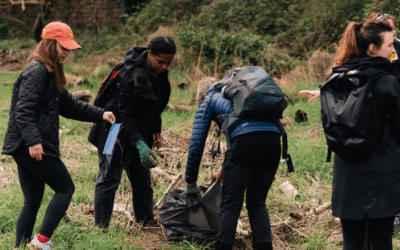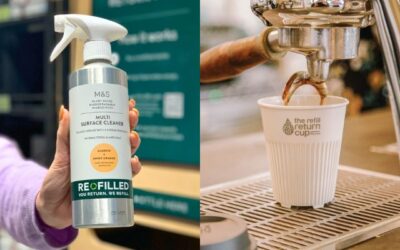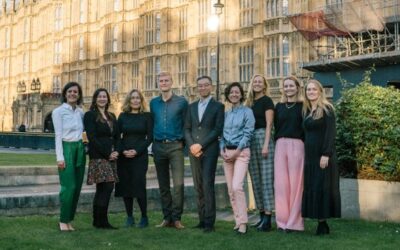From yes to what a mess
How EPR went wrong in the UK
WTF even is EPR?
Extended Producer Responsibility (EPR) is a very simple principle. It’s a policy that essentially means that polluters, the brands and businesses that create packaging waste, should pay to clean up the mess created by the products they sell.
If enforced, EPR would hold producers responsible for the collection, sorting, recycling or disposal of their product packaging. This means, in theory at least, businesses will have to fund the total cost of managing their packaging from production to disposal.
This would, at the stroke of a pen, transfer an estimated £1.7 billion each year (according to Defra) from brands & businesses to local authorities (who are currently responsible for managing our waste and taking on the responsibility of cleaning up the flood of packaging created and sold by businesses). Whilst they make a tidy profit, it’s essentially US the taxpayers that pay to clean up the mess.
EPR would have some obvious advantages like incentivising business to REDUCE pointless packaging. It would also “tip the scales” towards reuse systems that could then become more feasible as the throw away single-use alternatives become more expensive.

From yes to mess
Michael Gove won plaudits from across the environmental movement in 2018 when he welcomed EPR. It was embedded into government policy formation through the 2018 Resource and Waste Strategy for England. In 2019 the Conservative Party were unequivocal in their manifesto saying “We will introduce extended producer responsibility, so that producers pay the full costs of dealing with the waste they produce, and boost domestic recycling” (page 43). There then followed a UK-wide consultation in 2019 and a subsequent one in 2021. At this stage roll out EPR was still being promised by 2023. But by the time the last consultation responses were published in March 2022 the EPR roll out had been delayed until 2024.
Over a year later, the scheme has now been delayed AGAIN from the proposed date of October 2024 to 2025 with Defra saying:
“Following extensive engagement with industry, and in light of the pressure facing consumers and businesses in the current economic context, new rules to ensure packaging producers pay for the cost of recycling their packaging will be deferred a year from October 2024 to 2025.”

What happens next?
Well Defra have said that “Government will use the additional year to continue to discuss the scheme’s design with industry and reduce the costs of implementation wherever possible”. But the political elephant in the room is that between now and when they say they will introduce this there will be a General Election. Meaning this government has just moved the fate of EPR out of their control and into the hands of whoever forms the next government.
What both business and our environment desperately need is for clarity and for the most ambitious timeline possible for EPR to be delivered in. It could be a game-changer but the time for delayed ambition is over, we need action.
GET THE LATEST FROM OUR BLOG
Plastic-Free July 2025
Plastic-Free JulyHow to get involved with Plastic-Free JulyWelcome to Plastic Free July! Although we’re slightly late to the party, we’re really excited to be participating for another year in this amazing global initiative. Started in 2011 by Plastic Free Foundation,...
Introducing Refill Return
Introducing Refill ReturnA new chapter to power the new reuse economyAt Refill, we’ve always believed in tackling waste at its source. As long-time behaviour change experts and passionate advocates for upstream solutions to the single-use crisis, we’re driven by a...
GENeration ReuZe
GENeration ReuZeEmpowering Young Voices for a Greener Future This Earth Day, we’re thrilled to launch GENeration ReuZe — a powerful new campaign from City to Sea, in partnership with Youth Environmental Service (YES), and supported by the Big Give’s Green Match Fund....
Chew Plants Not Plastic
Chew Plants Not PlasticA Call to Ban Plastic-Based Chewing GumDid you know most chewing gum contains plastic? Yes, that piece of gum in your mouth is actually made from the same plastics found in carrier bags, shampoo bottles, and even car tyres. And we brits chew a...
Shoppers Want Reusable Packaging to Tackle Single-Use Waste
Shoppers Want Reusable Packaging to Tackle Single-Use Waste – Here’s Why At City to Sea, we're on a mission to tackle single-use plastic waste, and it’s clear the public is right behind us. Our latest poll reveals that a massive 75% of UK public believe reusable...
Taking the Reuse Manifesto to Parliament
Taking the Reuse manifesto to parliamentWhat is the City to Sea team doing at Westminster…again? City to Sea, CEO Jane Martin explains how we took our Reuse Manifesto to the Houses of Paliament.One of the great things about stepping up as CEO of mighty campaigning...







